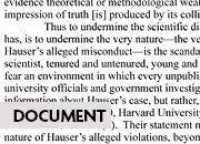While the authors of the study praise Harvard’s insistence on preserving confidentiality—calling it a “well-justified, codified policy”—they criticize a “headline-hungry media” for perpetuating unfounded gossip about Hauser and his body of work.
The authors argue that a charge of fabrication in any of three published studies is “curious” because, according to Harvard, the experiments for the studies were “designed and conducted,” implying that they must have taken place. They also say that it is “curious” to find Hauser “solely responsible” for misconduct because in two of the studies he did not collect or code the data himself.
The letter argues that “it would be impossible… for [Hauser] to micromanage all experiments, verifying all details,” but acknowledges that since Hauser was a principal investigator in these studies, he is ultimately responsible for the work coming out of his lab.
Much of Hauser’s research involves the observation of primates’ responses to various stimuli. Based on those responses, Hauser has drawn conclusions on their ability to understand language, a method that critics say is prone to observer bias.
The authors of the letter accuse critics of exploiting media attention on the issue to cast doubt on Hauser’s entire body of work. These claims, according to the letter, “are patently absurd and should offend all researchers by reducing science from an (imperfect) form for rational inquiry and assessment to a kangaroo court.”
Hauser’s studies have been “numerously, diversely, and robustly replicated ... both by his lab and others,” the letter says. Furthermore, the authors cite generations of young scientists who have studied under Hauser as a sign that Hauser himself was a “productive” scientist.
“Would they be so esteemed and able to replicate and extend their mentor’s work if they had trained under a regime of fabrication, falsification, and plagiarism?” the letter asks. “Is it rational to believe that Hauser is the godfather of a secret international cartel for scientific fraud?”
Bennett G. Galef Jr, an emeritus professor of psychology at McMaster University, reviewed Harvard’s evidence for misconduct in the three published cases for Hauser and his lawyers, and the authors quote from personal correspondence with Galef that casts doubt on the University’s findings.
“In my opinion there is nothing in the charges and data relating to the three published articles to show Hauser guilty of anything. Rather, what I saw on numerous occasions in numerous ways was Harvard violating what I take to be elementary principles of natural justice,” Galef is quoted as writing.
The authors conclude the letter by encouraging fellow scientists to consider the implications Hauser’s case could have on the field.
“As scientists, we all ought to be scared by the idea of an inquisitorial method that abolishes the scientific method by prying into unpublished work, feeds a media frenzy […] and overlooks the hypocrisy of the critics who fail to look at their own vulnerabilities and how they run their own labs… we will need all our wits about us to face this clear and present danger,” they write.
The letter was written by Pierre Pica, a scientist at the National Center for Scientific Research; Bert Vaux, director of studies in linguistics at King's College in the University of Cambridge; and Jeffrey Watumull, a Ph.D. student at the University of Cambridge. Watumull previously worked in Hauser's lab.
—Staff writer Julia L. Ryan can be reached at jryan@college.harvard.edu.
READ MORE: Read the letter signed by the academics here.










